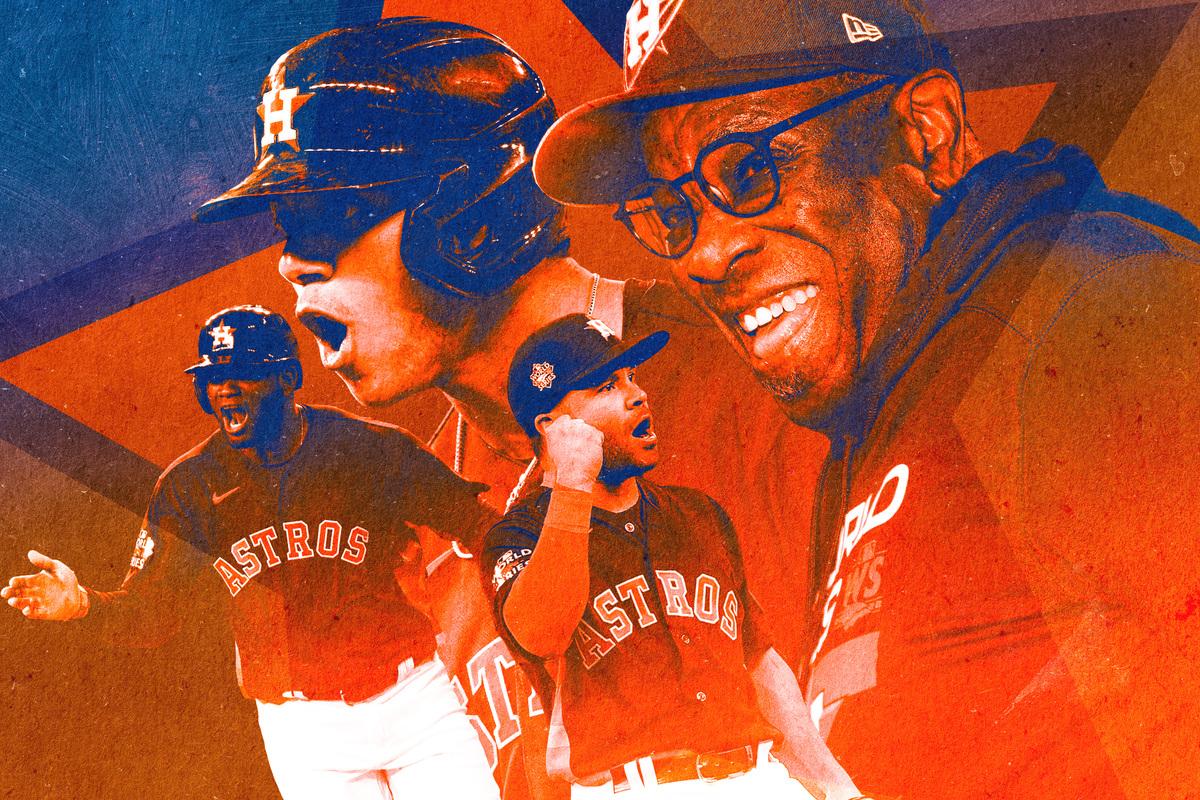
Most baseball fans wanted one more upset. The third-place, third-wild-card, sixth-seed Philadelphia Phillies had already beaten three better-on-paper teams to win the National League pennant, including the Central-winning Cardinals and the East-winning, 101-win Braves. The Phillies’ third victim, the Padres, had defeated the 111-win Dodgers and the 101-win Mets en route to the NLCS. Why couldn’t one more titan be toppled in the final round? The 106-win Houston Astros entered the World Series a formidable favorite, but great Astros teams had been beaten by underdogs before.
This one, however, wouldn’t be. The Astros topped the Phillies 4-1 on Saturday to win the World Series in six games. This Houston team was too good and too deep for the Phillies—in this timeline, at least. An Astros victory wasn’t actually inevitable; we’re talking about playoff baseball, with all the randomness that entails. If they’d played this matchup in the multiverse, the Phillies of other Earths would’ve won the series roughly 40 percent of the time. On the only Earth we know, though, the Astros outpitched, outhit, and outfielded the Phils to become deserving victors.
The Astros’ dominance doesn’t have to be celebrated, but it can’t be denied. Dating back to 2015, when the post-tanking Astros got good, only the Dodgers have had more regular-season success—and Houston now has one more pennant and title on its ledger than the Dodgers do. The first of the pennants and the first of the titles are forever tainted by the 2017 team’s notorious sign-stealing scheme. But barring any future nefarious revelations, this year’s ’Stros won fair and square. You can hate the Houston Astros, but in this case, you also have to hand it to them.
Residual resentment aside, there isn’t that much reason to hate these Astros, specifically (not that hate is usually reliant on reason). This Houston team wasn’t under new ownership, but it was under new management, in the dugout and the front office. It was also very different on the field from the 2017 team. Only five members of the 2022 roster—including pitchers Justin Verlander and Lance McCullers Jr.—also played for the previous World Series winner. Of the three holdover hitters, one (José Altuve) was reportedly, and auditorily, the hitter on the 2017 team most averse to stealing signs himself; another (Yuli Gurriel) was the worst regular on the 2022 team. (The third was Alex Bregman, who established himself as a heel even before he was outed as a cheater.) Altuve had a horrendous October and early November, Verlander and McCullers pitched poorly in the postseason (combining for a 5.86 ERA in seven starts and 35 1/3 innings), and though Gurriel and Bregman hit well in the playoffs, they weren’t the signature standouts of Houston’s championship run.
The Astros’ 2022 postseason spotlight instead belonged to ALCS and World Series MVP Jeremy Peña, who outshone every other star first-year player in the playoff field and became the first rookie position player to win World Series MVP honors. It belonged to Yordan Alvarez, who demolished the Mariners in the ALDS and, after slumping in the ALCS and early World Series, delivered the coup de grâce against the Phillies with a titanic three-run homer in Game 6. It belonged to Cristian Javier, who spearheaded his second combined no-hitter of the season, and the second no-hit game in World Series history. It belonged to Framber Valdez, who allowed four total runs in four postseason starts. It belonged to a best-in-class bullpen that lived up to its billing by recording a 0.83 ERA in 54 1/3 innings pitched. And, notwithstanding a miscue or two along the way, it belonged to Dusty Baker, who at long last won his first title as a major league manager, burnishing and possibly sealing his Hall of Fame case.
In other words, most of the Astros who just earned rings would have been easy to root for in any other uniform. (Cheers to Trey Mancini.) And most did nothing more to merit sign-stealing opprobrium than, say, Phillies backup catcher Garrett Stubbs, who played for the Astros from 2019 to 2021.
Most fans understand the distinction between no-good, dirty sign stealers and innocent teammates, but as long as a few of the former still played for Houston, the latter were likely to be booed by association. It’s hard to have drama without conflict, and it’s hard to care about conflict without a villain. The Astros have played that part well since late 2019, when their past transgressions were unearthed, due in no small measure to the fact that they’ve kept winning even as they’ve been taunted. Had they been severely punished, whether by Rob Manfred or by abject failure on the field, opposing fans might have laid off a little. Instead, the Astros have absorbed some draft-pick penalties and largely led a charmed existence, making half of their record six consecutive ALCS appearances since their wrongdoing was exposed. Thus, the fans have stepped up—and spoken up—to fill the karmic void and mete out retribution one chant, trash can, and sign at a time. If the horn effect caused some sympathetic players to become collateral damage in fans’ verbal assaults against the guilty targets, so be it.
Throughout their invective tours of the league, the Astros barely missed a beat. Former general manager Jeff Luhnow was banished, and the Astros kept winning. Former manager A.J. Hinch was suspended (and then hired to manage the Tigers), and the Astros kept winning. Ace Gerrit Cole left via free agency after 2019, and the Astros kept winning; they’re fifth in starting-pitcher FanGraphs WAR since his departure, and they finished first in that department in 2022. Center fielder George Springer left via free agency after 2020, and the Astros kept winning; Houston’s no-name replacements outperformed him in 2021, and though they didn’t repeat that feat this year, the best of the bunch, Chas McCormick, made the play of the series in Game 5. Shortstop Carlos Correa left via free agency after 2021, and the Astros kept winning: Peña approximated Correa’s Baseball-Reference WAR during the regular season and then came up clutch in the playoffs.
Astros owner Jim Crane could (and probably should) have ponied up for one or more of those players, but his team could hardly have enjoyed a more productive past few seasons if he had. After the Astros’ lackluster 2020, it looked like their window could be closing. Instead, they’ve replenished lost talent by developing players from within, including some (such as Alvarez) who blossomed into big prospects and others (such as Valdez, Javier, and Luis Garcia) who never appeared on a top 100 prospects list. With or without Baker and GM James Click, whose contracts are expiring (and who have earned renewals), the Astros will probably be back next October. They won with the homegrown-est roster of any champion this century, and in an era of overpowering moundsmen, their pitching pipeline is unparalleled.
That Astros pitching held opposing hitters to a .163/.259/.321 line in the series. The Phillies, who clobbered five homers in a 7-0 Game 3 win, mustered just three runs over the final three contests. The Astros’ slash line (.240/.305/.365) wasn’t good, but it only had to be better than the Phillies’. That gap can’t be chalked up entirely to pitching: A pronounced and predictable disparity in defense came back to bite the Phillies too. In Game 5, which the Astros took by one run, the Phillies’ center fielder and first basemen made costly misplays, while the Astros’ center fielder and first baseman saved the game with their gloves.
In Game 6, the Astros got six strong innings from Valdez, the king of the quality start. They also got a towering homer from Alvarez, whose mojo was seemingly restored by a last-minute adjustment to his hand position. Alvarez’s tater was preceded by a Martín Maldonado hit by pitch and a Peña single, which chased Phillies starter Zack Wheeler from the game. Those inclined to think the worst of the Astros may seize on Maldonado’s plunking as the latest evidence of the team’s duplicitous soul; as he confessed in a postgame interview, he didn’t attempt to get out of the way. But unlike Game 1 plate ump James Hoyt, who prevented Aledmys Díaz from taking his base when he even more egregiously leaned into a pitch, Game 6 ump Lance Barksdale didn’t summon Maldonado back.
It’s not uncommon for players—especially light-hitting ones—to try to work their way on in this manner. Maldonado, a glove-first guy who was playing through a broken hand and a sports hernia, was doing whatever he could. It’s not really legal, but it’s hardly unusual to get away with it. Hell, a hitter once admitted to faking a hit by pitch on a ball that hit his bat to get a free base from Barksdale. The unscrupulous, unsportsmanlike perpetrator of that hit-by-pitch pantomime: Derek Jeter.
Phillies manager Rob Thomson will be second-guessed to high heaven for pulling one of his aces (who, in a first for the Phils in the series, was actually pitching like one) after only 70 pitches—three fewer than Blake Snell had thrown in a 1-0 Game 6 of the 2020 World Series before the hook heard ’round the world. Wheeler wasn’t pleased to be pulled, even though Thomson was following the proactive, largely successful script he’d stuck to throughout the playoffs. Neither Wheeler nor Alvarez has a huge platoon split, but Wheeler has a hefty career third-time-through penalty, and the odds were probably slightly on Thomson’s side. As the Phillies’ previous playoff opponents discovered, though, that’s not always enough.
As I noted in my series preview, “The more times a reliever faces the same hitter within a single series (particularly a postseason series), the worse he tends to do. The Phillies, who have roughly three trusted relievers—Seranthony Domínguez, José Alvarado, and … let’s call David Robertson and Zach Eflin half-trusted relievers who add up to a third—run the risk of overexposure if the series goes six or seven games.”
Alvarado was facing Alvarez for the fourth time in the series, and that may have made the difference. But that doesn’t mean that letting Alvarez face the right-handed Wheeler—who suffered from fatigue in Game 1—for the sixth time in the series would have been a better choice. There’s no good option against Alvarez, and Thomson’s decision would have been questioned had Alvarez gotten a hit off of Wheeler, too. For the second time in this postseason, a left-handed pitcher missed his spot against the Astros’ slugger, and Alvarez went deep to make the southpaw pay. The other guy lives in a big house, too.
The Astros were the better team in this final boss battle, but you have to hand it to the entertaining, indefatigable Phillies, too. The Phillies tried and failed to execute an Astros-style rebuild, but when it sputtered, they went all in instead of folding. The Phillies were one of the biggest spenders last winter, and splurging on Kyle Schwarber and Nick Castellanos, among other players (on top of previous sizable commitments to Wheeler, J.T. Realmuto, and Bryce Harper) gave them the game’s fourth-highest payroll this year. They went for it and were rewarded, though not quite as richly as the 2019 Nationals were. They just made it to the tournament, and once there, they almost won it. They’re an argument in favor of not easing off the gas—and, for those who prize postseason chaos, also for the expanded playoff field, without which their record wouldn’t have qualified them for a postseason berth. Like Realmuto’s ninth-inning, Game 5 drive toward right-center, their title run died at the wall, but they gave it (and us) a ride.
In the wake of this World Series, there’s going to be a lot of legacy talk. The “D” word—“dynasty”—is, unsurprisingly, already being bandied about in regard to the Astros, and the stain on their reputation is being reexamined. “I wasn’t here in 2017, but I can imagine it’s definitely a weight off everybody’s shoulders,” closer Ryan Pressly said on Saturday. “Nobody can say shit now.”
That’s not quite right. Plenty of people can and will continue to give the Astros shit, collectively and individually. (After the game, “Cheaters” was trending on Twitter.) This title doesn’t absolve the Astros who cheated (or created a toxic culture), and it doesn’t prove that Houston would have won the 2017 championship without cheating. What it does do is lend further credence to the conclusion that cheating isn’t the only thing the Astros have excelled at—which the 2019 and 2021 teams had already demonstrated. A close inspection of the 2017 group told the same story: That squad’s decrease in strikeout rate was foreseeable (and foreseen), and lots of studies suggest that the Astros’ sign stealing didn’t help them on the whole. Most fans haven’t seen those studies, and if they did, they wouldn’t believe them. Plus, even if that research is right in the aggregate, it’s possible that a stolen sign paid off at just the right time to put those Astros over the postseason hump.
Some players still bear the Astros ill will, but antipathy toward Houston is mostly a fan phenomenon. Since the scandal broke, 13 of the 29 non-Astros teams have rostered one of the 2017 team’s confirmed sign-stealers, and only six teams (the Orioles, Guardians, Rockies, Royals, Cardinals, and Dodgers) have given no playing time to any member of that club. Luhnow, who acquired almost three-quarters of the players on the Astros’ latest World Series roster, is running a Spanish soccer team—out of baseball by choice, he claims. But beyond Luhnow and disgraced former assistant GM Brandon Taubman, Astros executives and coaches have been much in demand.
Hinch and 2017 bench coach (and sign-stealing instigator) Alex Cora were tapped to manage immediately after their suspensions expired, and just last month, competing teams pounced on two people responsible for some of Houston’s success with signing and developing players: The Giants poached Astros assistant GM Pete Putila to be their GM, and the Marlins hired Houston international scouting exec Oz Ocampo as their assistant GM. Astros bench coach Joe Espada just interviewed for two manager jobs. The Astros’ rivals come to emulate the Astros, not to condemn them. If their competitors can’t beat them, they’ll hire them.
That was true when the wounds of 2017 were far fresher, so it’s certainly true now that the scabs have started to form. The 2022 title needs no asterisks, caveats, or qualifiers. A viral late-October tweet warned, “The Houston Astros are a perfectly engineered baseball machine of death no one in their right minds would challenge, but the Philadelphia Phillies are ‘That sign can’t stop me because I can’t read’ personified as a baseball team.” Maybe the Astros stole that sign too; they wanted to be challenged. “The only way we can fix it is, we’ve got to beat everybody,” Crane told his tarnished team after the cheating came to light. The owner conceded on Saturday, “I don’t think it’s ever fixed.” But the “beat everybody” part? That the Astros could do—and they did.

